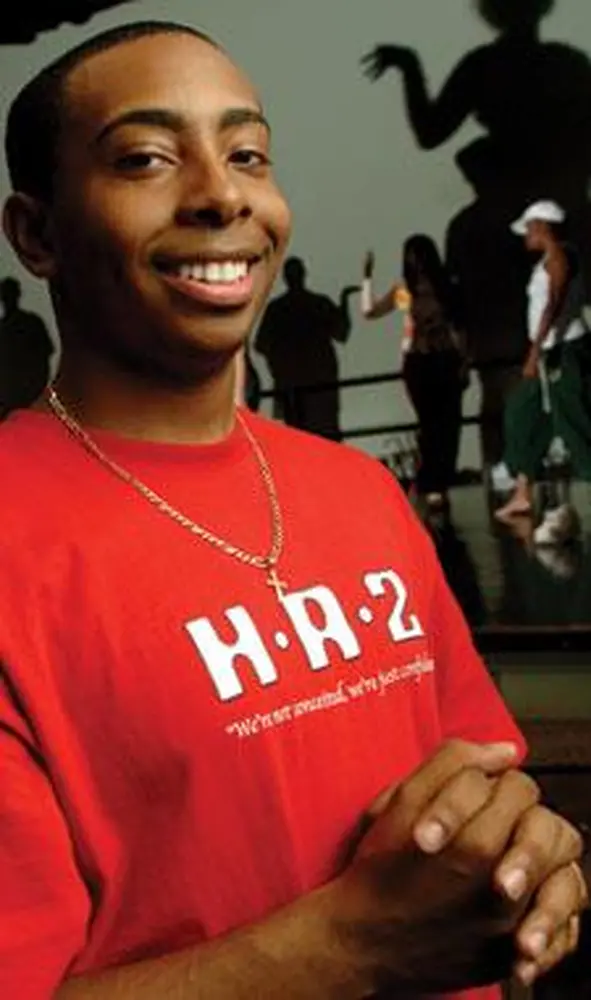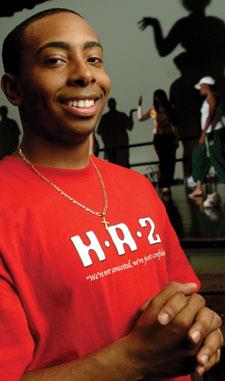

Politicians are known for their fancy footwork, whether it's sidestepping questions or dancing around touchy issues. But Ulric Shannon prefers to tackle political issues head-on and saved the fancy footwork for House Arrest 2, the nationally known hip-hop dance group in which he performed.
Shannon, who majored in political science and minored in African American studies, recently graduated from the University of Illinois. He says the House Arrest 2 dance team allowed him "to be free, release tension, show my creative side, and just be able to chill."
It was an important outlet for this good-natured, driven 21-year-old who came to the U of I on a prestigious $100,000 Posse Foundation Leadership and Academic Scholarship. Shannon hails from the Austin neighborhood on the far west side of Chicago where few students go on to college. In fact, he is one of only two kids from his grammar school class of 60 to go to college.
Shannon's goal is to move on to law school and then return to his Austin neighborhood, where he might run for alderman and possibly work his way up through Chicago politics.
"I looked around my community and saw that nothing was being changed," Shannon says. "That's when I decided to go into politics."
Being a realist, however, Shannon says it takes a lot of money to run for office. So his alternative plan, if politics don't pan out, is to go into the legal field, possibly employment and labor law.
Although Shannon grew up on the west side of Chicago, he managed to get into Lane Technical High School, a prestigious school on the north side of the city, where he thrived. Shannon was the vice president of student council, president of the Black Student Union, captain of the track team, a drum major and section leader for the band, and an active member of the public policy debate team-a breathtaking array of activities that kept him at school from 7 a.m. to 7 p.m. most days.
Ironically, he says he never really viewed himself as a leader until he took a stand on an issue close to his heart during his senior year in high school. According to Shannon, the Black Student Union had decided that for international day, in which different ethnic groups showcase their culture, they would highlight legendary black musicians from the 1970s on. But the faculty adviser told Shannon that they needed to stick to African music and dance instead.
"We wanted to do something different, you know, because black people are not just African," Shannon says. "I was really upset when they said we couldn't do this."
So Shannon led a protest, distributing T-shirts that said, "What is Black?" and the school eventually relented.
"Honestly, it was the first time I saw myself as a leader," he says. "But from that time on, I always stood up for myself."
In fact, Shannon's leadership skills carried him far in the "Posse Scholarship" competition, which he describes as a kind of academic American Idol. The competition begins with as many as 1,000 students in each of the five select cities-Boston, Chicago, New York, Washington, D.C., and Los Angeles. Through a grueling series of workshops and interviews, the number is whittled down to 10 for each university in the program.
These 10 students become a "posse"-a group of friends who are there to back each other up in the challenging university environment.
At U of I, Shannon helped to revive the policy debate team, and he was active with the campus chapter of the House Arrest 2 hip-hop dance team. They performed in competitions twice a month and have been undefeated for the past year.
Shannon also had a chance to travel to Mexico City to study the political system there; and last summer he worked as an intern for a Chicago outfit that helps organize unions among home-care workers. Oddly, he even found himself caught up in an effort to organize a union to demand better wages from the very organization that promotes unions.
Whenever Shannon returns to his Austin neighborhood, he says he is pleased that people are genuinely interested in college life.
"Many people there don't know about college life except what they see on TV," he says. "But when I come back, it is easy to get into conversations with people I have not spoken with in a long time. They want to know what college is all about."
Through all of the pressures of both high school and college life, he credits his ultimate "posse"-his family-for their support, particularly his oldest sister, 15 years his senior.
"My sister and I get into it a lot and fight," Shannon says. "But she has pushed me and motivated me. While everyone else is applauding and saying you're doing such a good job, she would be there to push me and say you can always do better. I appreciate that from a sister."


